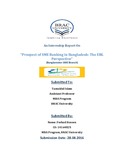Prospect of SME banking in Bangladesh: the EBL perspective

View/
Date
2016-08-28Publisher
BRAC UniversityAuthor
Hossen, ForhadMetadata
Show full item recordAbstract
SME financing is an important sector of banking activities. It is said that small and medium enterprises (SME) account for about 50 percent of GDP and 60 percent of employments. SMEs are projected to contribute between 25 and 35 percent of world manufactured exports. Financial Institutes around the world are relentlessly trying to enhance the SME exposure in their groups. Eastern Bank Ltd. (EBL) is a third generation bank which started its operation on 16th August 1992 as a scheduled Bank. Over the years Eastern Bank Ltd has expanded the financing exposure all over Bangladesh. SME sector is one of them. Although all over the world, the importance of SME financing is highly appreciated and entertained, this sector lacks proper boost from the government and attention of financial organizations. There are many reasons that financial organizations especially banks are unwilling in financing to the small and medium enterprises. Eastern Bank Ltd is currently motivated hard to enhance the SME exposure of the bank. A questionnaire survey was conducted on a selected portion of SME clients to find out the actual scenario of SME financing in EBL. The survey reflected the demographic profiles of the selected portion of the clients like the age, educational background, the problems they are currently facing, proprietors' perceptions about EBL SME, waiting period for the loan etc. From the survey, the most significant observations found were, most of the proprietors are in range of 2550 years of age, the SME loan is mostly used for purchasing raw materials by the proprietors, lengthy system is the most common problem of EBL SME pointed out by the proprietors. Interview with the SME bankers open the problems they face during the SME management. According to them the highest problems for them were limited opportunity to offer flexible repayment options, confusion with borrowing terms and conditions, incorrect information regarding the borrower, security risk, documentation risk, risks in unsecured lending and monitoring activities. The comparative analysis of EBL's performance in SME sector reveals that the bank is relentlessly trying to increase the SME portfolio as shown in 2015 & 2016. In recent years EBL is quite successful in developing themselves as a successful bank in SME sector of Bangladesh.
